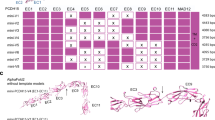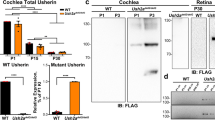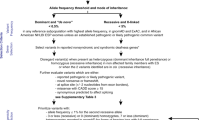Abstract
Usher syndrome is a frequent cause of the combination of deafness and blindness due to retinitis pigmentosa (RP). Five genes are known to underlie different forms of Usher syndrome type I (USH1). In the Ashkenazi Jewish population, the R245X mutation of the PCDH15 gene may be the most common cause of USH1 (Ben-Yosef T, Ness SL, Madeo AC, Bar-Lev A, Wolfman JH, Ahmed ZM, Desnick RK, Willner JP, Avraham KB, Ostrer H, Oddoux C, Griffith AJ, Friedman TB N Engl J Med 348: 1664–1670, 2003). To estimate what percentage of Ashkenazi Jewish children born with profound hearing loss will develop RP due to R245X, we examined the prevalence of the R245X PCDH15 mutation and its carrier rate among Ashkenazi Jews in Israel. Among probands diagnosed with nonsyndromic hearing loss not due to mutations of connexin 26 (GJB2) and/or connexin 30 (GJB6), and below the age of 10, 2 of 20 (10%) were homozygous for the R245X mutation. Among older nonsyndromic deaf individuals, no homozygotes were detected, although one individual was heterozygous for R245X. The carrier rate of the R245X mutation among the normal hearing Ashkenazi population in Israel was estimated at 1%. Ashkenazi Jewish children with profound prelingual hearing loss should be evaluated for the R245X PCDH15 mutation and undergo ophthalmologic evaluation to determine whether they will develop RP. Rehabilitation can then begin before loss of vision. Early use of cochlear implants in such cases may rescue these individuals from a dual neurosensory deficit.
Similar content being viewed by others
Log in or create a free account to read this content
Gain free access to this article, as well as selected content from this journal and more on nature.com
or
Abbreviations
- ERG:
-
electroretinograms
- SNHL:
-
sensorineural hearing loss
- RP:
-
retinitis pigmentosa
- USH1:
-
Usher syndrome type 1
- USH2:
-
Usher syndrome type 2
- USH3:
-
Usher syndrome type 3
- NSHL:
-
nonsyndromic hearing loss
- PCDH15:
-
protocadherin 15
- ASPCR:
-
allele-specific PCR
References
Boughman JA, Vernon M, Shaver KA 1983 Usher syndrome: definition and estimate of prevalence from two high-risk populations. J Chronic Dis 36: 595–603.
Hope CI, Bundey S, Proops D, Fielder AR 1997 Usher syndrome in the city of Birmingham—prevalence and clinical classification. Br J Ophthalmol 81: 46–53.
Smith RJ, Berlin CI, Hejtmancik JF, Keats BJ, Kimberling WJ, Lewis RA, Moller CG, Pelias MZ, Tranebjaerg L 1994 Clinical diagnosis of the Usher syndromes. Usher Syndrome Consortium. Am J Med Genet 50: 32–38.
Petit C 2001 Usher syndrome: from genetics to pathogenesis. Annu Rev Genomics Hum Genet 2: 271–297.
Ness SL, Ben-Yosef T, Bar-Lev A, Madeo AC, Brewer CC, Avraham KB, Kornreich R, Desnick RJ, Willner JP, Friedman TB, Griffith AJ 2003 Genetic homogeneity and phenotypic variability among Ashkenazi Jews with Usher syndrome type III. J Med Genet 40: 767–772.
Mustapha M, Chouery E, Torchard-Pagnez D, Nouaille S, Khrais A, Sayegh FN, Megarbane A, Loiselet J, Lathrop M, Petit C, Weil D 2002 A novel locus for Usher syndrome type I, USH1G, maps to chromosome 17q24–25. Hum Genet 110: 348–350.
Ahmed ZM, Smith TN, Riazuddin S, Makishima T, Ghosh M, Bokhari S, Menon PS, Deshmukh D, Griffith AJ, Friedman TB, Wilcox ER 2002 Nonsyndromic recessive deafness DFNB18 and Usher syndrome type IC are allelic mutations of USHIC. Hum Genet 110: 527–531.
Bork JM, Peters LM, Riazuddin S, Bernstein SL, Ahmed ZM, Ness SL, Polomeno R, Ramesh A, Schloss M, Srisailpathy CR, Wayne S, Bellman S, Desmukh D, Ahmed Z, Khan SN, Kaloustian VM, Li XC, Lalwani A, Bitner-Glindzicz M, Nance WE, Liu XZ, Wistow G, Smith RJ, Griffith AJ, Wilcox ER, Friedman TB, Morell RJ 2001 Usher syndrome 1D and nonsyndromic autosomal recessive deafness DFNB12 are caused by allelic mutations of the novel cadherin-like gene CDH23. Am J Hum Genet 68: 26–37.
Boeda B, El-Amraoui A, Bahloul A, Goodyear R, Daviet L, Blanchard S, Perfettini I, Fath KR, Shorte S, Reiners J, Houdusse A, Legrain P, Wolfrum U, Richardson G, Petit C 2002 Myosin VIIa, harmonin and cadherin 23, three Usher I gene products that cooperate to shape the sensory hair cell bundle. EMBO J 21: 6689–6699.
Weil D, Kussel P, Blanchard S, Levy G, Levi-Acobas F, Drira M, Ayadi H, Petit C 1997 The autosomal recessive isolated deafness, DFNB2, and the Usher 1B syndrome are allelic defects of the myosin-VIIA gene. Nat Genet 16: 191–193.
Weil D, El-Amraoui A, Masmoudi S, Mustapha M, Kikkawa Y, Laine S, Delmaghani S, Adato A, Nadifi S, Zina ZB, Hamel C, Gal A, Ayadi H, Yonekawa H, Petit C 2003 Usher syndrome type I G (USH1G) is caused by mutations in the gene encoding SANS, a protein that associates with the USH1C protein, harmonin. Hum Mol Genet 12: 463–471.
Liu XZ, Newton VE, Steel KP, Brown SD 1997 Identification of a new mutation of the myosin VII head region in Usher syndrome type 1. Hum Mutat 10: 168–170.
Liu XZ, Walsh J, Mburu P, Kendrick-Jones J, Cope MJ, Steel KP, Brown SD 1997 Mutations in the myosin VIIA gene cause non-syndromic recessive deafness. Nat Genet 16: 188–190.
Zina ZB, Masmoudi S, Ayadi H, Chaker F, Ghorbel AM, Drira M, Petit C 2001 From DFNB2 to Usher syndrome: variable expressivity of the same disease. Am J Med Genet 101: 181–183.
Astuto LM, Kelley PM, Askew JW, Weston MD, Smith RJ, Alswaid AF, Al-Rakaf M, Kimberling WJ 2002 Searching for evidence of DFNB2. Am J Med Genet 109: 291–297.
Astuto LM, Bork JM, Weston MD, Askew JW, Fields RR, Orten DJ, Ohliger SJ, Riazuddin S, Morell RJ, Khan S, Kremer H, van Hauwe P, Moller CG, Cremers CW, Ayuso C, Heckenlively JR, Rohrschneider K, Spandau U, Greenberg J, Ramesar R, Reardon W, Bitoun P, Millan J, Legge R, Friedman TB, Kimberling WJ 2002 CDH23 mutation and phenotype heterogeneity: a profile of 107 diverse families with Usher syndrome and nonsyndromic deafness. Am J Hum Genet 71: 262–275.
Alagramam KN, Yuan H, Kuehn MH, Murcia CL, Wayne S, Srisailpathy CR, Lowry RB, Knaus R, Van Laer L, Bernier FP, Schwartz S, Lee C, Morton CC, Mullins RF, Ramesh A, Van Camp G, Hageman GS, Woychik RP, Smith RJ, Hagemen GS 2001 Mutations in the novel protocadherin PCDH15 cause Usher syndrome type 1F. Hum Mol Genet 10: 1709–1718.
Ahmed ZM, Riazuddin S, Bernstein SL, Ahmed Z, Khan S, Griffith AJ, Morell RJ, Friedman TB, Wilcox ER 2001 Mutations of the protocadherin gene PCDH15 cause Usher syndrome type 1F. Am J Hum Genet 69: 25–34.
Ahmed ZM, Riazuddin S, Ahmad J, Bernstein SL, Guo Y, Sabar MF, Sieving P, Griffith AJ, Friedman TB, Belyantseva IA, Wilcox ER 2003 PCDH15 is expressed in the neurosensory epithelium of the eye and ear and mutant alleles are responsible for both USH1F and DFNB23. Hum Mol Genet 12: 3215–3223.
Suzuki ST 2000 Recent progress in protocadherin research. Exp Cell Res 261: 13–18.
Alagramam KN, Murcia CL, Kwon HY, Pawlowski KS, Wright CG, Woychik RP 2001 The mouse Ames waltzer hearing-loss mutant is caused by mutation of Pcdh15, a novel protocadherin gene. Nat Genet 27: 99–102.
Ben-Yosef T, Ness SL, Madeo AC, Bar-Lev A, Wolfman JH, Ahmed ZM, Desnick RK, Willner JP, Avraham KB, Ostrer H, Oddoux C, Griffith AJ, Friedman TB 2003 A mutation of PCDH15 among Ashkenazi Jews with the type 1 Usher syndrome. N Engl J Med 348: 1664–1670.
Morell RJ, Kim HJ, Hood LJ, Goforth L, Friderici K, Fisher R, Van Camp G, Berlin CI, Oddoux C, Ostrer H, Keats B, Friedman TB 1998 Mutations in the connexin 26 gene (GJB2) among Ashkenazi Jews with nonsyndromic recessive deafness. N Engl J Med 339: 1500–1505.
Sobe T, ErlicH P, Berry A, Korostichevsky A, Vreugde S, Shohat M, Avraham KB, Bonné-Tamir B 1999 High frequency of the deafness-associated 167delT mutation in the connexin 26 (GJB2) gene in Israeli Ashkenazim. Am J Med Genet 86: 499–500
Sobe T, Vreugde S, Shahin H, Berlin M, Davis N, Kanaan M, Yaron Y, Orr-Urtreger A, Frydman M, Shohat M, Avraham KB 2000 The prevalence and expression of inherited connexin 26 mutations associated with nonsyndromic hearing loss in the Israeli population. Hum Genet 106: 50–57.
Lerer I, Sagi M, Malamud E, Levi H, Raas-Rothschild A, Abeliovich D 2000 Contribution of connexin 26 mutations to nonsyndromic deafness in Ashkenazi patients and the variable phenotypic effect of the mutation 167delT. Am J Med Genet 95: 53–56.
Lerer I, Sagi M, Ben-Neriah Z, Wang T, Levi H, Abeliovich D 2001 A deletion mutation in GJB6 cooperating with a GJB2 mutation in trans in nonsyndromic deafness: a novel founder mutation in Ashkenazi Jews. Hum Mutat 18: 460
del Castillo I, Villamar M, Moreno-Pelayo MA, del Castillo FJ, Alvarez A, Telleria D, Menendez I, Moreno F 2002 A deletion involving the connexin 30 gene in nonsyndromic hearing impairment. N Engl J Med 346: 243–249.
del Castillo I, Moreno-Pelayo MA, Del Castillo FJ, Brownstein Z, Marlin S, Adina Q, Cockburn DJ, Pandya A, Siemering KR, Chamberlin GP, Ballana E, Wuyts W, Maciel-Guerra AT, Alvarez A, Villamar M, Shohat M, Abeliovich D, Dahl HH, Estivill X, Gasparini P, Hutchin T, Nance WE, Sartorato EL, Smith RJ, Van Camp G, Avraham KB, Petit C, Moreno F 2003 Prevalence and evolutionary origins of the del(GJB6-D13S1830) mutation in the DFNB1 locus in hearing-impaired subjects: a multicenter study. Am J Hum Genet 73: 1452–1458.
Maquat LE 1996 Defects in RNA splicing and the consequence of shortened translational reading frames. Am J Hum Genet 59: 279–286.
Loundon N, Marlin S, Busquet D, Denoyelle F, Roger G, Renaud F, Garabedian EN 2003 Usher syndrome and cochlear implantation. Otol Neurotol 24: 216–221.
American College of Medical Genetics, 2002 Genetics Evaluation Guidelines for the Etiologic Diagnosis of Congenital Hearing Loss. Genetic Evaluation of Congenital Hearing Loss Expert Panel. ACMG statement. Genet Med 4: 162–171.
Greinwald JH, Hartnick CJ 2002 The evaluation of children with sensorineural hearing loss. Arch Otolaryngol Head Neck Surg 128: 84–87.
Acknowledgements
The authors thank the family members for their generous cooperation in this study and Mira Berlin, Bella Davidov, Miri Yanuv, Batsheva Bonne-Tamir, and Andrew Griffith for their contributions.
Author information
Authors and Affiliations
Corresponding author
Additional information
Supported by the Israel Ministry of Science, Culture and Sport (K.B.A.), the European Community (QLG2-1999-00988) (K.B.A.), and the National Institute on Deafness and Other Communication Disorders intramural research project ZO1 DC000039-06 (T.B.F.).
Rights and permissions
About this article
Cite this article
Brownstein, Z., Ben-Yosef, T., Dagan, O. et al. The R245X Mutation of PCDH15 in Ashkenazi Jewish Children Diagnosed with Nonsyndromic Hearing Loss Foreshadows Retinitis Pigmentosa. Pediatr Res 55, 995–1000 (2004). https://doi.org/10.1203/01.PDR.0000125258.58267.56
Received:
Accepted:
Issue date:
DOI: https://doi.org/10.1203/01.PDR.0000125258.58267.56
This article is cited by
-
Frequency of Usher syndrome type 1 in deaf children by massively parallel DNA sequencing
Journal of Human Genetics (2016)
-
USH1K, a novel locus for type I Usher syndrome, maps to chromosome 10p11.21–q21.1
Journal of Human Genetics (2012)
-
Stem Cell-Based Therapeutic Applications in Retinal Degenerative Diseases
Stem Cell Reviews and Reports (2011)
-
Targeted genomic capture and massively parallel sequencing to identify genes for hereditary hearing loss in middle eastern families
Genome Biology (2011)
-
Genetics and pathological mechanisms of Usher syndrome
Journal of Human Genetics (2010)



